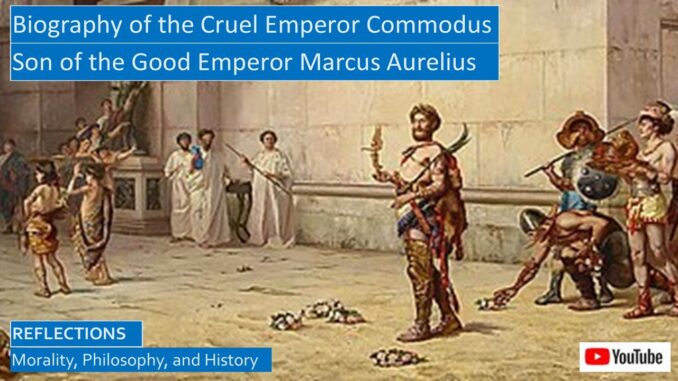
What can we learn by reflecting on the reign of the cruel Roman Emperor Commodus?
How could the only Stoic Philosopher-King, and the last of the Five Good Emperors, Marcus Aurelius, father the disastrously cruel and incompetent Commodus?
Why did a Roman Emperor seek to degrade himself by competing as a gladiator in the Roman arena?
How similar was Commodus to the infamous Nero?
Why was the Roman Empire so unstable after his disastrous reign?
YouTube Script with Book Links:
https://www.slideshare.net/BruceStrom1/cruel-commodus-son-of-stoic-marcus-aurelius-last-of-the-good-roman-emperors
YouTube video for this blog: https://youtu.be/iXHVCzW0YOQ
DISASTROUS REIGN OF EMPEROR COMMODUS
The wise stoic reign of Marcus Aurelius, beloved by all, was followed by the murderous reign of Commodus, hated and feared by all, who would be assassinated by his closest companions.
The disastrously reckless cruelty of Commodus, and his neglectful reign, which nearly caused the disintegration of the Roman Empire, colors the opinion of both ancient and modern historians. What historians mention, but do not emphasize, are the similarities between the soldier Hadrian and Commodus. Both liked to fight in the ring as gladiators. Both decided to halt the Roman policy of expansion, seeking strategic withdrawal. And Marcus Aurelius was as wary of his adoptive grandfather Hadrian as he was of his wayward son Commodus.
Christians were relieved that, unlike Nero, Commodus did not actively persecute the Christians after he became emperor. Commodus had developed a taste for the cult of Mithras, as he was contemptuous of Greek culture. Commodus was eclectic, tolerating many Eastern cults, and he may have seen Christianity as yet another one of these cults. Marcia, his favorite mistress, was a Christian, she could influence the emperor to ease any persecutions.[1]
THE YOUNG COMMODUS WAS NOT A GOOD STOIC STUDENT
The modern historian Will Durant says, “Twin sons came in 161; one died at birth, the other was Commodus. Scandalmongers called him a gladiator’s gift to Queen Faustina,” as she was widely suspected of being unfaithful to her loving husband, “and Commodus strove all his life long to confirm the tale. But he was a handsome and vigorous lad, and he strove all his life long to confirm the tale.”
Will Durant continues, “The young Commodus preferred to dance, sing, hunt, and fence; he developed an understandable aversion to books, scholars, and philosophers, but enjoyed the company of gladiators and athletes. Soon he surpassed all comrades in lying, cruelty, and coarse speech. Marcus was too good to be great enough to discipline him or renounce him; he kept on hoping that education and responsibility would sober him and make him grow into a king.”[2]
LAST YEARS OF MARCUS AURELIUS
The modern historian Frank McLynn states, “By unilaterally imposing his con Commodus as his successor, without any reference to the wishes of the Senate or indeed any consultation, Marcus Aurelius was accused of undermining the legitimacy and credibility of the entire Roman state and of mocking of his frequent gestures of respect, honor, and deference for the Senate. The unhesitating choice of Commodus was odd, as his base character had been evident since childhood. From his earliest years Commodus was naturally cruel and dishonorable,” and he worsened with age.
“Sexually precocious,” “he kept an informal harem of pressganged or dragooned women. His deep character flaws were on full display when at age twelve the bath was too cool, so he ordered that his bath-keeper be burned alive.” His slave burned a sheepskin in the furnace instead.
Commodus was not open to Stoic teaching. One observer notes, “The best philosophers lectured before the youth and he listened,” like a bored lion,
“allowing his instructors to have their say, yawning and showing them his long teeth all the while.” “Marcus naively believed that a loving environment would ensure that all evil was driven out of the boy.” “Commodus was excessively spoiled; developed no moral sense, notions of duty or responsibility; and worshipped a temple of the self, where only his will and his pleasures counted.”
Unfortunately, Marcus was on the front fighting the Germans during the boy’s formative years. Even Marcus started to have a sense of foreboding about his son, but he felt that there was no other option but to promote Commodus, since he sensed his mortality, sharing the consulate with his son in the year 173. When his son was in his teens, he accompanied Marcus to the fronts, first in the East, then departing for the Second German Expedition in late 178.
Early in 180 Marcus fell deathly ill of the Antonine Plague, likely smallpox. McLynn notes, “Marcus at one sent for Commodus, stressing that it was imperative that the German war be brought to a successful completion. He put the maximum pressure on his son, saying that if he did not obey his last wishes, this would constitute a betrayal of the interests of the Roman state.”
Cassius Dio mentioned that Marcus Aurelius did not die from the disease from which he was suffering. What he meant by this historians can only speculate. Was he referring to assassination? Was he suggesting that chronic chest and stomach ailments contributed? But Cassius Dio provides an epitaph: “Marcus Aurelius always tolerated the faults of others, neither inquiring too closely into them nor chastising the perpetrators.”[3]
COMMODUS NEGOTIATES PEACE WITH THE GERMANIC TRIBES
At the death of Emperor Trajan during his military campaign, his successor Hadrian pulled back the borders of Rome to what he considered to be defensible borders and spent his reign consolidating the Empire. The more prosperous provinces had been conquered, but historians have ever since debated whether this was the beginning of the decline of the Roman Empire, with the belief that the empire would either expand or contract. Many historians believe that the Roman economy had grown to depend on wealth flowing in from conquered provinces.
Historians have criticized Marcus Aurelius for not wanting to expand the empire, but Marcus had realized, during the Marcomannic Wars in Germany that he needed to fulfill the dream of Augustus and push the boundary of the empire to the Eble to secure the borders of Rome.
But that was not to be, the newly ascended emperor Commodus proclaimed: “My father has gone up to heaven and now sits as a companion of the gods. We must concern ourselves with human matters and govern affairs on earth.” Immediately after his father’s death, Commodus “announced that he intended to wind up the war in Germany and not pursue Marcus’ policy of annexation.”
Was this a strategic withdrawal as was orchestrated by Hadrian? Frank McLynn argues there were valid strategic considerations and the need for the new emperor to return to Rome to secure his throne, as there were already plots afoot to replace him. McLynn observes that “Commodus argued that the benefits of continuing military action in Germania were not clear, but the risks were.” “Commodus attempted to turn the tables on his critics by claiming that Marcus had not really been aiming a annexation, but simply at protectorate status for Marcomannia, and that his overtures towards friendly Germans” was to “create a Romanized local elite, the future aristocracy of a new Roman protectorate.”
This was not the policy that Marcus had advanced, but Commodus did not want to end the war on unfavorable terms. He conducted a lighting campaign to defeat one Germanic tribe, offering generous terms, and when the remaining Germanic tribes realized that he was serious, the remnants of the Quadi and Marcomanni tribes surrendered.
What were the terms of peace? Will Durant tells us that the Germanic tribes “were to withdraw from the vicinity of the Danube, to surrender most of their arms, return all Roman prisoners and deserters, pay Rome an annual tribute of corn, and persuade 13,000 of their soldiers to enlist in the Roman legions. All of Rome condemned him except the people; his generals fumed at allowing the trapped prey to escape and fight again another day. During the reign of Commodus, however, no trouble came from the Danubian tribes.”
COMMODUS RETURNS TO ROME
Why else was Commodus so eager to return to Rome? Will Durant reveals that “he hunted beasts on the imperial estates and developed such skill with sword and bow that he decided to perform publicly. For a time, he left the palace and lived in the gladiator’s school; he drove chariots in the races and fought in the arena against animals and men. Presumably, the men who opposed him took care to let him win; but he thought nothing of fighting, unaided and before breakfast, a hippopotamus, an elephant, and a tiger, which made no distinctions for royalty. He was so perfect a bowman that with a hundred arrows, he killed a hundred tigers in one exhibition.”
McLynn opines that “Commodus’ elevation to the purple was the end of the line for the Senate.” Commodus was not popular with the Senate, but he was popular with the citizens of Rome. He recklessly distributed cash payments to the citizens of Rome, without worrying about where the money would come from. When his advisors told him he could not simply coin money at will, he decided to simply accuse some wealthy citizens of treason, so he could use their wealth to help balance the budget.
Commodus fancied himself as nobly born, but as McLynn notes, “under this carapace of nobility lurked a gliding monster, a seeming avatar of all the deadly sins. Pathologically idle, and thus a born delegator even of the most important decisions, a drunkard and a lecher, Commodus was also venal and would sell anything if the price was right.” Murderous, “sinister, cruel, obscene and scandalous, he was either a psychopath or a sociopath,” or both.
As in the reign of Nero, his debauchery and capriciousness unsettled his acquaintances and others in the army and the senate. Coups were contemplated and plotted throughout his twelve-year reign. A few years into his reign Lucilla, the widow of the previous co-emperor with Marcus Aurelius, plotted his assassination, but the assassins talked when they should have stabbed, and were overwhelmed by the emperor’s bodyguards.
This reminds us of the famous scene in The Good, the Bad, and the Ugly, where another bad guy surprises Tuco in a bubble bath, waving a gun and pontificating on why he was going to shoot him, unaware of the pistol hidden in the bubbles. Tuco famously quips, “When it is time to shoot, shoot, don’t talk.”
https://www.youtube.com/watch?v=vKGmBYv09jQ
Commodus delegated the day-to-day decisions of the empire to a series of rogues, as each would tend to fall out of favor, often losing their lives, when they showed excessive greed and hubris. The first of the rogues may have uncovered another assassination plot, or maybe it was a concoction. This was followed by exiles and possibly executions, but this made Commodus paranoid, so he sacked all his top commanders and purged the upper ranks of the army.
His paranoia expanded, he targeted anyone he suspected or did not like, including senators, the wealthy, the overly intelligent. He descended into a three-year binge of pleasure and debauchery, again leaving the running of the government to an appointed rogue, who was every bit as cruel as he was. He maintained a harem of hundreds of boys and concubines, many involuntarily seized. Commodus debased the Senate by stuffing it with his demented cronies. The casual murders and cruelties of Commodus increased with time to satisfy his increasing bloodlust.
McLynn asks, “How did such a crazed individual manage to remain in power” for a dozen years? “There were three main factors:
- His handling of the Senate.
- His popularity in the Army.
- His assiduous courting of the Roman mob.”
Commodus ensured that no senator could threaten his rule, appointed freedmen to the Senate, and sought to endow friendly senators with honorific positions with no real power. All senators were cowed by his frequent execution and winnowing of the senatorial ranks. The ordinary soldiers liked Commodus because he ended the endless wars, pandered to their whims, made promotions easier, and was lax about discipline.
Cleander, the last rogue that Commodus had appointed to run the affairs of the government, precipitated an uprising of the population. Conspirators had engineered a shortage of grain, which was blamed on the cruel Cleander. The mob seized Cleander and killed him and his entire extended family, dragging his body by chariot through the streets of Rome.
Commodus responded by sinking deeper into paranoia and madness, publicly humiliating suspected conspirators before executing them. He purged fifteen senators and ex-consuls, as well as their families. Rome had already been unsettled by a fresh outbreak of the plague, many political factions took advantage of the chaos to settle old scores, and professional hitmen were hired to stab victims with needles coated with plague spores.
The gladiatorial games became more spectacular throughout his reign, he debased the currency to pay for them. Commodus’ delusions of grandeur compelled him to declare “that he was literally the incarnation of the god Hercules,” and not only that, “he was truly the lord of the universe,” “an emergent super-deity, rather like the Zeus of the Stoics.” This only “increased the levels of his homicidal paranoia.”
PLOTTING THE ASSASSINATION OF COMMODUS
Then in 192, as in the reign of Nero, there was a Great Fire in Rome, though this fire only “destroyed the Temple of Peace, most of the imperial palace, the grain warehouses, and the state archives.” His companions pleaded with Commodus to halt the madness, that he was alienating most of Rome. His companions reluctantly joined the conspiracy to overthrow the mad emperor, possibly fearing for their own lives.
Commodus would not listen to reason, and when his companions learned that he intended to assassinate both new consuls on New Year’s Day in 193, they accelerated their plotting. The conspirators decided to goad Commodus to destroy whatever goodwill he had left among the masses, the senators, and the soldiers. They planned a fourteen-day killing spree in the arena, where “the demented Commodus slaughtered every conceivable species of wild animal, lions and bears in particular.”
“This orgy of animal massacre culminated in an ostrich hunt.” In his excited hubris, Commodus felt himself as a god, and “approached the senatorial box to threaten and browbeat them.” He held the head of an ostrich in his left hand and raised his bloody sword in his right. He said nothing, but nodded his head with a grin, showing he would treat the senators likewise.” This alarmed the senators, and the conspirators spread rumors that Commodus planned to massacre some of the spectators as well.
Like Nero’s friends, out of fear, his closest companions turned against him. On New Year’s Eve of 192, Commodus was given a cup of poison, but he vomited it up. But when this failed, Commodus was strangled by his personal trainer. General Pertinax then announced to the people of Rome that Commodus had died a natural death, that he had been appointed to succeed him, and that every citizen of Rome would be given a large donative of 12,000 sesterces.
MyLynn tells us, “The Senate ordered all Commodus’ statues and portraits destroyed.” “There were no deification ceremonies for Commodus. Instead, the Senate branded him ‘more savage than Domitian and more foul than Nero. Let the memory of the foul gladiator be utterly wiped away.’”
Likewise, many modern historians conclude that whatever benefits had accrued to the benefit of the empire from the wise ruler of the Stoic Philosopher-King Marcus Aurelius, were utterly wiped away and destroyed by his reckless son Commodus.
CHAOTIC YEAR OF FIVE EMPERORS
After the cruel emperor Nero was assassinated, the Roman Empire endured the year of the Four Emperors, until finally the armies of Trajan restored order, and embarked on remarkable conquests that rejuvenated Rome. Trajan was the second of the Good Emperors that ended with the rule of Marcus Aurelius, none of the good emperors inherited the throne. Trajan was succeeded by General Hadrian during a military campaign, and Hadrian adopted the next emperor, the aging Senator Antonius Pius, who in turn adopted Marcus Aurelius.
xxxx
Likewise, after Commodus was assassinated, the Roman Empire endured the year of the Five Emperors. McLynn tells us that Pertinax, though he was competent, “did not last long as emperor, since the praetorians, now accustomed to being above the law, murdered him when he tried to reintroduce discipline. The end of the empire was prefigured when it was auctioned off to the highest bidder.”[4] Didius Julianus. Septimus Severus, a senator who had also served as proconsul in Africa, declared himself emperor twelve days after the murder of Pertinax, deposing and killing Didius. Pescennius Niger also declared himself emperor, and his civil war lasted two years.
Clodius Albinus was asked to become emperor after Commodus, but he initially declined. Although he and Severus were enemies, they agreed that Clodius would reign as Caesar over Britain, Gaul, and Iberia. But after three years, another civil war erupted between them.
REIGN OF SEPTIMUS SEVERUS AND THE SEVERAN DYNASTY
Septimus Severus would reign for eighteen years, restoring stability in the Roman Empire. But his relations with the Senate were never good. He seized power with help from the army, turning the Roman Empire into a military dictatorship. He executed many senators, charging them with corruption or conspiracy. At the beginning of his reign, he replaced the Praetorian Guard that had murdered his predecessors with loyal soldiers from his battalions. He led military campaigns in Syria, Africa, and Britain, extending the borders of the Empire.
Severus continued the policy of Trajan towards the Christians, they should be punished only if they refused to worship the emperor and the gods, but they were not to be sought out. There were persecutions under his reign, as reported by Eusebius, but the Church Father Tertullian reported that the emperor was well disposed towards the Christians. Persecutions were local and were not empire-wide, there were few if any persecutions in Rome under his reign.[5]
Although the rulers of the Severan dynasty would rule until the Crisis of the Third Century, chaos continued for over a century, some emperors were better than others. In one 37-year stretch, there were 35 emperors. This Crisis was finally resolved by the strong hand and reforms of Diocletian and the first Christian Emperor, Constantine the Great, which led to the establishment of a Western and Eastern Roman Empire. Constantine would move the capitol to Constantinople, now Istanbul in the straits of Turkey.
[1] Frank McLynn, Marcus Aurelius, A Life (Philadelphia, PA, Da Capo Press, Random House 2009), Chapter 17, pp. 444 and 436.
[2] Will Durant, The Story of Civilization, Volume 3, Caesar and Christ, (New York: Simon and Schuster, 1961, 1944), Chapter 19, pp. 430-432.
[3] Frank McLynn, Marcus Aurelius, A Life, Chapter 16, pp. 401-419 and Anthony Birley, Marcus Aurelius, A Biography (New York: BT Batsford, 2000, 1966), Chapter 9, pp. 198-210.
[4] Durant, Caesar and Christ, Chapter 20, pp. 446-447, and Frank McLynn, Marcus Aurelius, A Life, Chapter 16, pp. 420-451, and https://en.wikipedia.org/wiki/Year_of_the_Four_Emperors .
[5] https://en.wikipedia.org/wiki/Year_of_the_Five_Emperors and https://en.wikipedia.org/wiki/Septimius_Severus

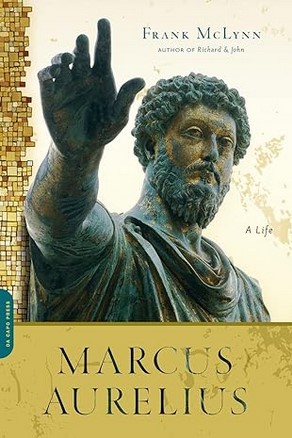
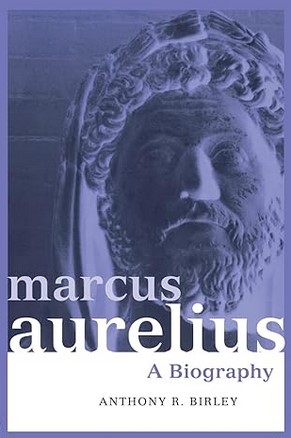
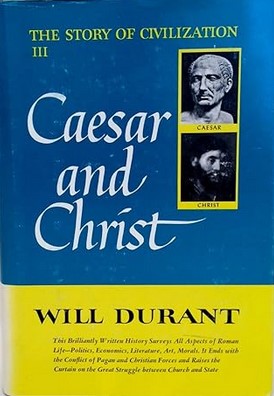
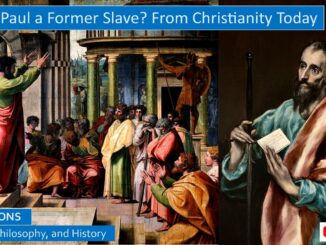

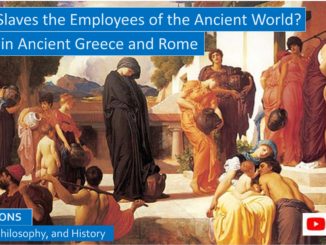
Be the first to comment